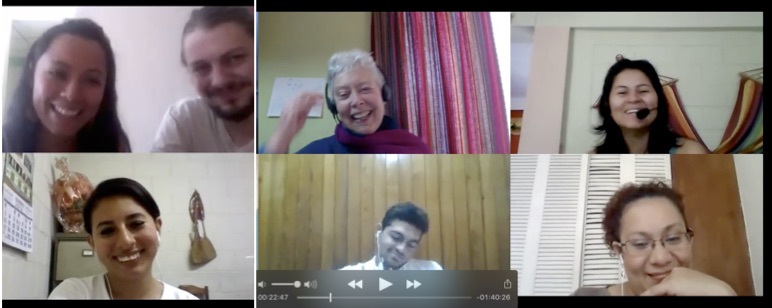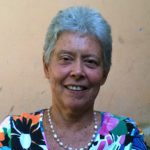Focuser’s Focus vol.19 No.3, Autumn Issue 2016
Focusing in El Salvador
By Beatrice Blake
(Certifying Coordinator, USA )

Since 2012, Focusing has been spreading in El Salvador through the thanks to donations from the international Focusing community and to the vision of Eeq’anil (a Mayan word for “the path of the seed”). Eeq’anil is an umbrella organization founded in 2007 by people who work at the crossroads of community organization and psychosocial growth. I have been able to provide tools for self-care and resilience to people who promote the wellbeing of young people of El Salvador. Eeq’anil provides training for group facilitators, counselors, school psychologists and others who are on the front lines of social change in El Salvador.
Salvadoran society is attempting to emerge from centuries of economic exploitation and institutionalized violence, by creating new forms of governance and the rule of law. This is no easy task! The country is struggling with a contentious political situation that is still divided along the lines drawn in the country’s 12-year civil war (1981-1992). The party of the former dissidents, the FMLN, has won two presidential elections in a row, and enjoys more popularity than the right-wing ARENA party. However, ARENA still wields a lot of political and economic power. Well-organized gangs have become part of in the social fabric and have put tremendous pressure on young people and on society as a whole, causing mass migrations to the US and other countries.
Eeq’anil sponsored my courses in ‘Focusing and the 12 Steps’ in 2012 and in ‘Focusing with Children’ in 2014. In 2016 they sponsored my online class in Generating a Culture of Peace. The course was made available to representatives of groups that are members of Eeq’anil. The course combines Nonviolent Communication with Focusing Level One. People who attended the course began with a desire to use the tools of Focusing and Nonviolent Communication to help young people and for their own ability to deal with the pressures they face in their demanding work. Alejandra Zuniga of CORDES said it very well: “As facilitators within communities is important for us to pay attention to our own personal growth and attempt to resolve our own emotional situations. Generating a Culture of Peace allows us to learn new skills to apply in work and personal life.”
My class in Generating a Culture of Peace, is a 6-week online course that uses Nonviolent Communication as a door to Focusing. When people talk about their feelings and needs as they do in NVC, they are already in Level 4 or 5 of the Experiencing Scale, providing an inner atmosphere conducive to Focusing. Twenty five people have taken the class since lasut October. I asked them how they are living Focusing. Here are some of their replies :
Heazel Martinez and Juan Carlos Hernandez started an online Changes group last November and are committed to the benefits of Focusing partnership. Our plan is to open the group to people from all over Latin America.
Psychologist Paty Berrios says “Just as the morning dew refreshes the plants, Focusing encourages us to meet the day, and helps us deal with the afternoon heat.”
Alicia Herrera Rebollo is sharing what she learned with a group of 18 women from her political party. She is also helping her elderly mother to express her feelings instead of keeping everything inside.
Melba Jimēnez has been part of a 3-year pilot project to bring psychosocial tools, like Focusing and NVC, to women in prizon. The Department of Corrections is now adopting the program, and Melba is collaborating on a training program for prison staff.
Rafael Zelaya, a youth group leader, says “When we have a turbulent situation, pausing and listening without judging helps me prevent disproportionate and violent reactions with the people around me.
“There are fewer crises when something doesn’t turn out as expected. The pause helps take the power out of emotions and lets me think of healthy solutions, by listening to myself and other people.
“There is a world so unknown, intriguing, changeable, questioning, contradictory and noble inside each one of us, just waiting for us to visit it and understand it. It’s very interesting to discover this, to know that you can learn how to accompany yourself in your inner world and that doing so helps you manage your emotions, channeling them so that you don’t feel so much frustration.”
Patricia B. says “I have more compassion for my own emotional pain. I feel like a part of me is more loving, and it is growing. When I find myself rushing to do things, I slow down and try to be more aware. I recognize that I can ask for help to solve my problems. I’m giving myself small gifts to meet my needs. I am careful to ask, considering the right of others to say Yes or No. I’ve gotten massages and taken naps to rest and be better able to serve others. All this strengthens my sense of well-being.”
Many of these participants have expressed interest in a longer, more formal training. I would love to continue working with these intelligent, open and courageous, people who have such a strong commitment to personal growth and to improving the lives of their fellow Salvadorans. Our dream is to train a strong team that will be able to support Salvadorans in their determination to create a more peaceful society.
Please help us realize this dream !
Beatrice Blake, June 15, 2016
Profile, Beatrice Blake, CFP

Beatrice Blake started out as a Doctor of Oriental Medicine (licensed by the State of New México in 1982).
Family ties led her to Costa Rica, where, as the author of a best-selling guidebook, she was instrumental in the shaping of that country’s ecotourism industry.
From 1982 to 1984, while living in Costa Rica, she volunteered doing acupuncture at a clinic for refugees from the Salvadoran Civil War (1980-1992). She saw their wounded bodies, listened to their wounded hearts, and was inspired by their incredible spirit. At the time, she wished to understand more about the body/mind connection so that she could do more to help them. When she first studied Focusing in 1989, she felt that she had found the key to that understanding. After raising a family, she returned to her fascination with the body/mind/spirit connection and in 2000 became a Certified Focusing Professional. She went on to study Thinking at the Edge from its developers, Psychologist / philosopher Eugene Gendlin, Kye Nelson and Nada Lou.
Now, in addition to teaching TAE online and in person, she is working on ways to teach Focusing and Nonviolent Communication to community groups in El Salvador and internationally.
Rather than advocating for peace and dialogue alone, Focusing and NVC show people HOW TO work with their own situations to resolve conflict — first in their own lives, then with their families, spreading into the community. Once people have experienced reduction in conflict in their own lives, it becomes easier to believe that peace is possible. In this way Focusing and NVC are changing lives in El Salvador and around the world.